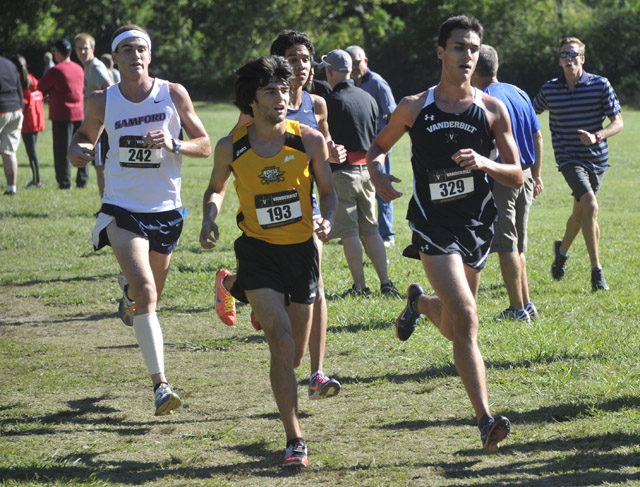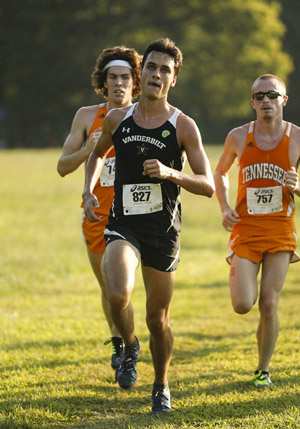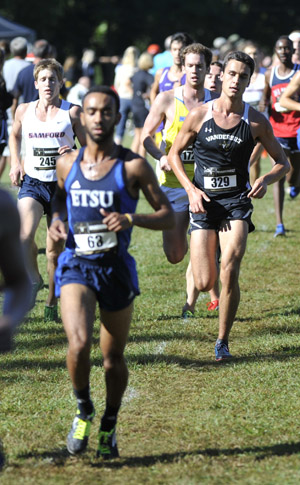Oct. 15, 2013

NASHVILLE, Tenn. – At 6:37 a.m. on Tuesday morning, the streets and sidewalks of 25th Avenue appear to be as dark and dull as the cloud-filled skies that hang overhead. Three white-coated men, walking towards a hospital in the distance, serve as the lone source of human life on the Vanderbilt University campus. For at least a few more hours, the rest of the student body will remain hidden amongst the warmth of their pillows and comforters; John Ewing, a junior on the Vanderbilt men’s cross country team, however, has a different agenda on his mind – 6:45 a.m. marks the beginning of practice.
“Morning, John,” Coach Rhonda Riley says, laughing as her top runner ignores her remarks and stations himself against the side railing of the stairs nearby. John is the first to arrive at the scene, and as several others follow, John remains in a fixed pose against the railing, staring at the ground below him, too tired to do much more than sway side-to-side in an effort to wake his lower half.
“They’re almost never awake,” Coach Riley tells me, revealing the secret that is all too obvious to anyone up at this hour. Practice will begin shortly, but it’s hardly the time for a motivational speech.
“Missing one. Fix? Anyone seen him this morning?”
John – the captain of the team this year – begins to count the number of huddled bodies, but soon drops his hand as Coach Riley continues to speak. He knows fully that she’ll start practice with or without his teammates present.
“We’re going back to threshold today, then 300s at the track,” she states plainly. “I want a comfortable, conversational pace. Only four miles today.”
A blonde-haired underclassman tilts his head back and lets out a sigh of relief. Coach Riley smiles again, then quickly moves on.
“This isn’t something we’re going to write home about. If you feel good at the track then you can open it up there. We’re just trying to get ready for Louisville.”
With two more quick sips of a water bottle, John and the seven other runners burst down the stairs and commence their warm-up jog towards Centennial Park, a few blocks away. It’s there that the half-hearted morning officially comes to an end – where the bed bugs are shaken off, and the showcase of SEC speed begins.
_________________
John Ewing first became involved in competitive racing when he was a freshman at Lakeside High School in Atlanta, Ga. It was there that he fell in love with the natural struggle of the sport; not so much the battle amongst other schools and runners, but rather the internal trial John had to face every time he laced up his sneakers.
“There’s definitely a uniqueness to it,” John told me a few days before the 2013 Commodore Classic – a race held here in Nashville in which John placed 50th, finishing as the top runner for Vanderbilt’s non-scholarship team. “Everybody probably says this about running, but the whole `personal achievement’ – you know, just competing with yourself – there’s a lot of satisfaction from working really hard, and then making it pay off on race day.”
 For John, that sense of fulfillment could not have been higher than last year, in his sophomore season, a year in which he set personal bests in the 5K (16:22 at the Belmont Opener), 8K (25:31 at the SEC Championships) and 10K (31:59 at the NCAA South Regional).
For John, that sense of fulfillment could not have been higher than last year, in his sophomore season, a year in which he set personal bests in the 5K (16:22 at the Belmont Opener), 8K (25:31 at the SEC Championships) and 10K (31:59 at the NCAA South Regional).
“It was definitely something that was really special to me, especially SECs and then Regionals,” John said. “Those were probably two of the best races I’ve ever run.”
Coach Riley called his Regional performance “the highlight” of the season.
“It’s so fun when your training comes together, you’re racing well and you’re able to just go out there and push it to the point where you know you’ve given everything,” John added. “It’s an amazing feeling, and those were really some special experiences.”
But John’s 2012 accomplishments come well short of satiating his appetite for improvement. 2013, he’ll tell you, marks the start of a new season, and that means new goals, new targets and new expectations for everyone involved.
“I want our team to be as cohesive and productive as possible, especially in meets like SECs, where we can go out and knock off as many teams as possible,” John said.
As for his personal goals?
“Yeah, I have a couple ideas floating around,” John told me, smiling and rubbing his hands together, almost maniacally.
This year, it seems he will face his toughest bout yet, with the stakes of complacency higher than they’ve ever been before.
_________________
“5:17!” an assistant coach calls out to John as he makes his way around the one-mile track of Centennial Park for the first time. The coach scribbles a few notes on his clipboard in preparation for the pack of runners that are less than 20 yards away.
“It’s intense. I mean, they push their bodies to a limit that normal people don’t experience,” Coach Riley tells me.
I begin to note the pedestrians around the park, leisurely jogging, or even walking around the same track as these Division I athletes. There’s a middle-aged man in a t-shirt and jeans lifting dumbbells over his head as he walks. And how about the elder, gray-haired woman in all black claiming she’s “too old for this.”
“You’re doing great,” Coach Riley replies, as if the woman is another member of the team.
 “10:31!” the assistant coach shouts to John, having completed his second mile at an even faster pace than the first. The blond-haired underclassman from before comes around the bend 43 seconds later, spitting to his left as he completes the mile, his silver necklace bouncing up and down against his chest.
“10:31!” the assistant coach shouts to John, having completed his second mile at an even faster pace than the first. The blond-haired underclassman from before comes around the bend 43 seconds later, spitting to his left as he completes the mile, his silver necklace bouncing up and down against his chest.
“Let’s go, Sam!” a group from the women’s cross country team calls out, having just arrived from the McGugin Athletic Center. The women gather on the carless street adjacent to the park to complete a final set of dynamic stretches. In less than fifteen minutes they’ll embark on a four-mile run of their own.
“15:42! Keep it strong, John!” the same assistant yells, this time offering a few words of encouragement with his time.
“Awesome!” Coach Riley remarks. But John is already too far down the path to show any kind of response. In a matter of seconds, he has disappeared around the first bend of his fourth mile, proving once again he’s got plenty left to give.
“That’s a good group right there,” Coach Riley comments on the two men finishing their third mile at 16:21.
“Last mile, Sam!” she then proclaims to the final member of the team to begin his fourth lap. The athlete furrows his brow and carries on down the course.
Three more minutes go by, and suddenly, John is seen sprinting down the final stretch of his trek.
“21:03!” the assistant announces one last time.
John pulls his hands atop his head in search of the wind deep inside his lungs. His elbows extend to his sides and his chest puffs out with each new breath.
“Let’s go, Matt!” John calls out seconds later.
In his mind, John’s run isn’t over until the whole team crosses the finish line.
_________________
At this point in the season, John’s focus is to get back into what he calls the “racing mindset” – the point at which he can trust his fitness to respond in the late stages of a race.
“That’s what brings the results,” John told me. “When you get to the point where you can compete in the back-half of the race.” When you can pass people, move up and push yourself to the front of the pack.
But the steps it takes to reach that point in training often go unnoticed. And even more so, is the fact that the notion of a cross-country team is completely overlooked.
“Especially in training – being able to push each other and go out and work hard everyday – anyone will tell you that’s so much easier to do with a team,” John said. “There is definitely a lot more of a team aspect to [cross-country running] than a lot of people realize.”
And perhaps, there’s no better place to witness that than through John’s interactions with his teammates. As Coach Riley will tell you, there’s no better leader on the team than John.
“He’s the full package,” Coach Riley said. “The guys see him as an example (eating well, getting sleep, running hard), and his performances speak for themselves.
“John’s our captain, and honestly, he’s kind of been [our captain] since his freshman year.
“He pays attention to detail. [He] never settles, always looking to be better in everything he does…hitting his goals and getting higher every year.”
But what Coach Riley likes most about John’s leadership is only partially captured by his low times and quick miles. The other half of his character comes from John’s life as a student, where he has found a way to weave his competitive spirit into his education at a prestigious university.
“John does everything and gives 100 percent – that’s in the classroom, in his running, being a leader – everything he does he’s passionate,” Coach Riley said. “Honestly, he’s everything we’re looking for in a student-athlete.”
As a chemical engineering major, John approaches his rigorous workload with the same mental toughness he uses on the track.
“I think being a part of a sports team prepares you for a lot of things in terms of being able to work with a team [and] being able to push yourself,” he said.
It’s one of the many reasons why John and his teammates are so proud to call themselves NCAA athletes, and members of the Vanderbilt community.
“I think Vanderbilt is doing a lot to prepare [me] for that career path,” John said, mentioning the possibility of attending med school in the future (at least he’s “fairly confident” that’s the direction he will be headed). “Vanderbilt has great resources in that realm, in terms of giving you opportunities to do research, to get in the hospital and shadow doctors, go to talks about healthcare – stuff like that.”
John takes full advantage of all the benefits his athleticism has brought him over the years, and what’s so interesting about John’s case – and for that matter, the men’s cross country team as a whole – is that he is a non-scholarship athlete at Vanderbilt.
“A lot of people say, `oh, you don’t have a scholarship, you don’t get this, that and the other,’ which is true… But, at the same time, [the men’s cross country team] is really blessed to have access to sports trainers that give you as much attention as you need, a great coaching staff, facilities in terms of a weight room and the opportunity to compete in the SEC.”
The next opportunity John and his teammates get to compete comes October 18 when they travel to Tuscaloosa, Ala. for the Crimson Classic.


